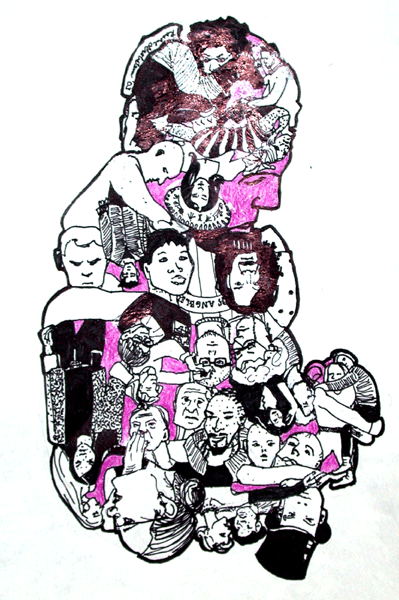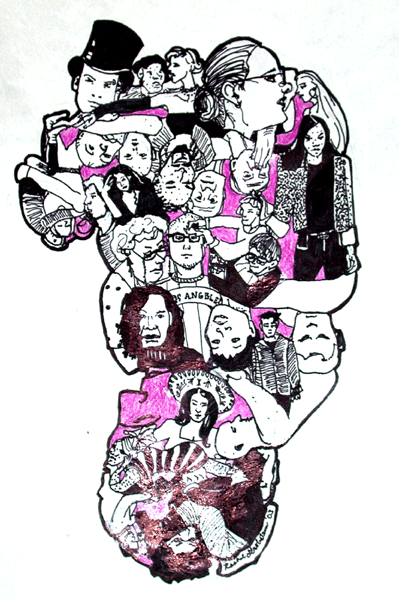Made available on Serendip
In association with Making Sense of Diversity: An Exploration, a world wide conversation

|
April 15, 2005
Paul Grobstein (Biology Department) and
Maria Scott-Wittenborn (07)
Breaking the Silence:
Mental Health Issues at Bryn Mawr College
Participants
Summary
Prepared by Anne Dalke
Additions, revisions, extensions are encouraged in the On-Line Forum
| 
|
Discussion opened with the observation that, while much discussion of diversity centers "on the visible" (sex, gender, ethnicity, physical abilities...) there is another difference which we are more reluctant to discuss: "what it feels like inside ourselves." The invitation here was to spend some time "talking out loud about our insides," in the hope of addressing the common concern that "our private selves are not appreciated, useful, even admissable in public conversation." Mental health has an "ambivalent status": we fear that, if we describe our mental state to others, they will perceive it as "not normal." Today's session was an attempt to "get more comfortable with internal difference," by exploring the possibility that sharing our experiences "inside" might be as productive as talking about the ways in which we are externally different.
The initial story of "an inside with some elements of instability you might find interesting" was prefaced by several resonant passages: Shakespeare's Hamlet described his loss of "mirth," the 18th century philosopher David Hume the torment of "a Coldness & Desertion of Spirit," and the 19th century poet Emily Dickinson her feeling of "a funeral in her brain....My mind was going numb." What we now call depression was given other names, like "melancholia," in the past. It is not a very pleasant experience, and part of the unpleasantness comes from not knowing either "where it comes from" or "what it is useful for." Why do I feel the way I do "inside," irrespective of what is happening "outside"? However, depression exists "not in me alone, but in the pattern of my interactions with others." A large part of the problem occurs in what goes on "between me and others, who expect behavior I don't feel like exhibiting." If they could see that, despite how I'm feeling, despite how I'm acting, this time is productive and necessary for me, the "pain would lessen." It would be good if we could better organize our culture to appreciate such differences.
The second story, of "fairly massive ADD," was similar in its account of how "others are mostly unsympathetic when I mess up: People notice what I do that makes their lives more difficult." (Or "they think they bore me.") Having ADD means "consistent upsets" that others cannot justify--and which they have little interest in trying to understand. You cannot explain accurately to them "why you are the way you are," and they cannot account for the behaviors they see. Rather than being compassionate, they may "accuse you of cheating"--which results in a sense of being alien and isolated. Although early diagnosis can mean the loss of stigma for being "dumb" or "not trying hard enough," it can also produce "an unfortunate side effect": a wide divide in the mind between the self and the disorder, a sense that ADD is "the typo" that "gets in the way of the person I could be," rather than--as it also is--the source of a number of positive contributions ("I am the most ungracefully alive person I know"). We can try and learn how, on a larger scale, such characteristics "run all through our personality," and acknowledge that the "instability of our insides" can be the source of unique contributions to the outside.
Other "internal instabilities"--depression, bipolarity, anxiety disorders--were "put on the table," and discussion thereafter was wide-ranging:
How useful are the distinctions we make among parts of ourselves?
What does it mean to "put a name" on a condition?
What about the time issue, of labeling something "once it's over"?
How can we recognize--and what can we do--when things go from "bad to very bad"? Of particular interest was the role of the culture at Bryn Mawr in increasing disability. David Hume observed several hundred years ago that depression is often related to a need to achieve, particularly to a need to be intellectually productive. Sometimes we use our social engagements and academic commitments to hold ourselves together. But "all issues are on a continuum," and the desire for perfectionism can reach the point of "being clinical" and "internally distressing." It's not part of the BMC culture to make room for mental health; "we can't drop out of life." We ignore depression because we have to meet deadlines; there is no time here to work through mental issues. Bryn Mawr feeds anxiety disorders; there is no space to stop and relax. But in our anxiety to do well, we can become paralyzed, unable to perform at all. And how much does such a pattern have to do with our own refusal to deal with more deep-seated issues? If we continue to be productive on the surface, we can keep ourselves busy enough to avoid the underlying problems which trouble us. People come here to be pushed--and to suffer.
Is the issue really one of productivity? Or one of being seen as productive? Or is it about allowing ourselves, and one another, times when we are not productive? You really can have a life that works for you.
All of us need to know that who we are is valuable and not hurtful to others. Our internal differences means that we are interdependent. Sometimes you feel that you can't trust yourself; you need others as a reality check (mention was made of the final scene in A Beautiful Mind, where John Nash gets that kind of support from a student). Perhaps "we are not deficient" in our inability (for instance) to pay attention; perhaps it is the culture's insistence on constant attentiveness and consistent high performance that creates such an "insane place." As Mahatma Gandhi said, "There is more to life than increasing the speed."
The discussion has continued further in the on-line forum on "Making Sense of Diversity," and will resume in person (for the last time this semester) at noon on Friday, April 29, when
Allie Petonic (05), Christina Gubitosa (06) and Paula Arboleda (05) will lead a discussion about "Interactions Between Race and Class on Campus."
| Return to Schedule for Friday Noon Conversations

| Bryn Mawr Conversations
| Archived
Forum
| Archive of Bryn Mawr Conversation
| General Conversation
| Serendip Home |
These pages are sponsored by the Bryn Mawr College Office
of Intercultural Affairs, the Center for Science and Society and the Serendip
website. Send us additional comments or suggestions at Serendip
© by Serendip 1994-
- Last Modified:
Wednesday, 21-June-2005 15:18:00 EST

